The taste of Georgian wine at New Wine Festival
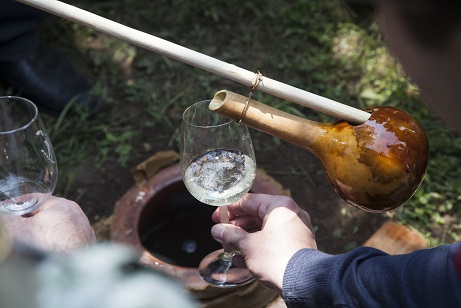

For the fifth time in recent years, the Ethnographic Museum’s picturesque outdoor garden was transformed into a place where a full array of wines from all over Georgia, represented by Georgia’s leading wine companies, family wine cellars and boutique wine makers, were on display.
Earlier this month, the museum’s outdoor venue was the place where the annual New Wine Festival was held.
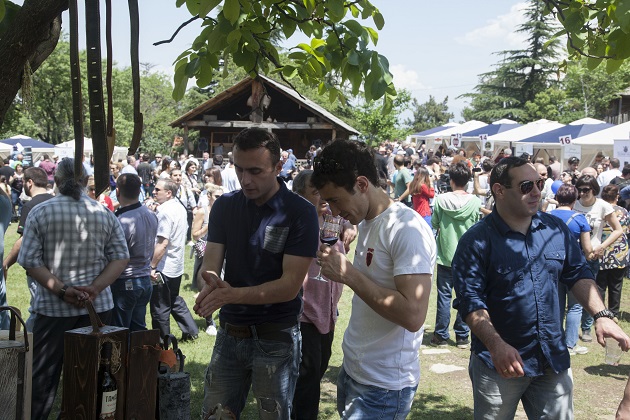 The New Wine Festival aimed to give guests, wine experts and sommeliers in the wine industry the possibility to taste wine made in various regions of Georgia and form an opinion on the products. Photo by Nino Alavidze/agenda.ge
The New Wine Festival aimed to give guests, wine experts and sommeliers in the wine industry the possibility to taste wine made in various regions of Georgia and form an opinion on the products. Photo by Nino Alavidze/agenda.ge
The annual festival is one of a handful of free events in Tbilisi, where patrons can enjoy a day out for free – the wine is free and Georgian winemakers proudly pour their creations into revellers’ glasses.
Local winemaker Giga Loladze travelled to Tbilisi from Chailuri, a village in Georgia’s wine producing region Kakheti, armed with his family’s signature wine - Muscat Rkatsiteli. His creation was the oldest domesticated white wine variety and has a pronounced sweet floral aroma. 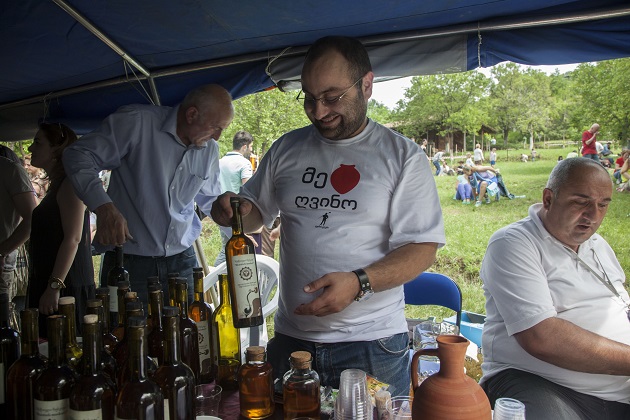 Winemaker Giga Loladze at his wine tasting station. Photo by Nino Alavidze/agenda.ge
Winemaker Giga Loladze at his wine tasting station. Photo by Nino Alavidze/agenda.ge
More than fifty years ago, Loladze’s grandfather planted the Muscat Rkatsiteli grape variety in Chalauri. The vineyard was passed down from generation to generation, father to son, and eventually, Loladze inherited his grandfathers’ crop.
"Before receiving the invitation to attend the wine festival, I never thought that my Muscat Rkatsiteli wine would gain so much praise from visitors. I knew it was a good wine and now others can appreciate it too,” he said while presenting his wine with passion, energy and enthusiasm.
"I have even made some money, I have sold some bottles.”
The wine festival encouraged Loladze to think about turning his family wine cellar into a commercial business.
"I plan to buy land near my orchard in Chalauri and plant Muscat Rkatsiteli. I believe it will grow and become my family business,” Loladze said.
Another producer of homemade wine was Luka Bibineishvili, who had travelled to the capital city from Adjara, the Black Sea region of Georgia. Throughout the festival he dressed in national costume to promote Chkhaveri, his creation of a semi-sweet rose wine. 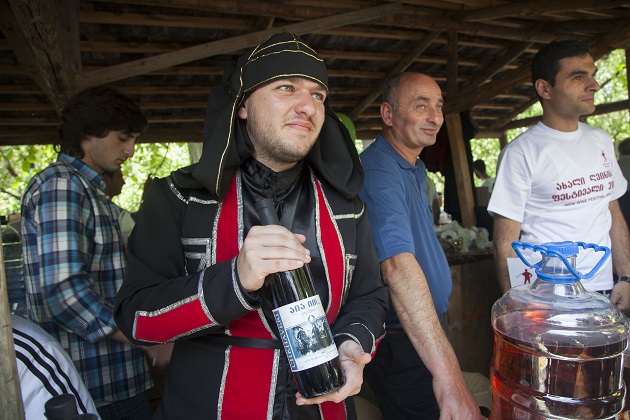 "It is extremely delicate and famous for its aroma. It is called a rose wine.” It was with these words that Luka Bibineishvili used to introduce his wine to Agenda.ge, after being asked to describe his product. Photo by Nino Alavidze/agenda.ge
"It is extremely delicate and famous for its aroma. It is called a rose wine.” It was with these words that Luka Bibineishvili used to introduce his wine to Agenda.ge, after being asked to describe his product. Photo by Nino Alavidze/agenda.ge
"Adjara is one of the oldest centers of viticulture and enology and I would like to keep this tradition. On the label of the bottle I made an inscription in local provincial dialect, Aia Iii, which means this is what you are looking for,” Bibineishvili said.
He used the picture of his ancestors as a logo on the bottles' label.
In front of Bibileishvili’s tasting station, president of the Georgian Wine Club and organiser of the New Wine Festival, Malkhaz Kharbedia, made a small speech to congratulate local winemakers for taking part in the festival.
He said during the festival, local winemakers could promote their products, raise awareness of their products and allow family wine cellars to compete against larger players in the wine industry.
"It is a golden era in Georgian wine as every wine producer, from large companies to boutique winemakers, will find their niche. You will find a buyer if you make a good wine,” Kharbedia said.
He believed Georgia’s major wine companies often had the opportunity to show their wines in public venues, while family winemakers had less of an opportunity to do so.
"This opportunity means it is very appealing to family winemakers and at the festival, guests can sample new 2013 wines,” Kharbedia added.
Homemade wine Atenuri, created by family winemaker Gigo Dvalishvili, had the special honour of opening the New Wine Festival alongside Georgia’s Parliament Speaker David Usupashvili.
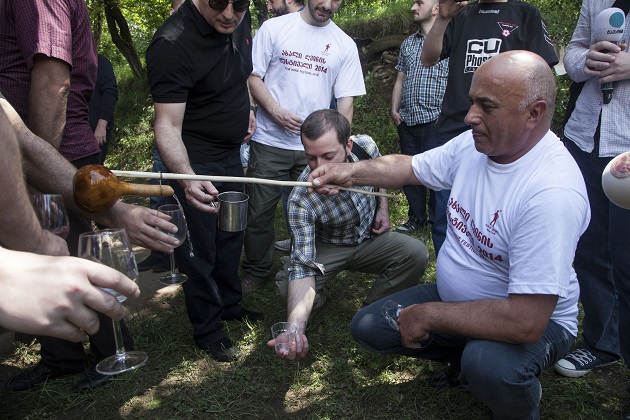 Family winemaker Gigo Dvalishvili welcoming the guests. Photo by Nino Alavidze/agenda.ge
Family winemaker Gigo Dvalishvili welcoming the guests. Photo by Nino Alavidze/agenda.ge
"Only my villagers know about my wine [so] it is funny that even the Parliament Speaker has tasted it,” Dvalishvili said while waiting for the qvevri opening ceremony with eagerness and anticipation.
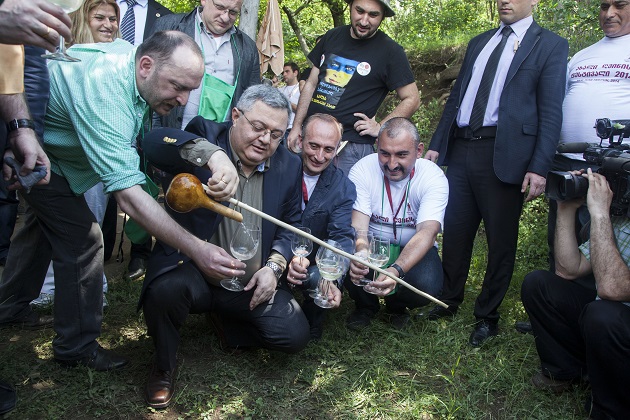 Parliament Speaker David Usupashvili pouring the first glass from orshimo. Photo by Nino Alavidze/Agenda.ge
Parliament Speaker David Usupashvili pouring the first glass from orshimo. Photo by Nino Alavidze/Agenda.ge
Atenuri wine made by Goruli Mtsvane and Chinuri grape varieties in Gori, eastern Georgia, was specifically poured in qvevri, a large earthenware vessel originally from Georgia which was buried in the Ethnographic Museum’s yard.
Usupashvili uncorked the qvevri and traditionally said: "Abundance, abundance. It is a sun, it is a sun.” It is local tradition to praise wine while pouring the first glass from orshimo, a long-handled gourd to ladle wine from a qvevri.
The very first toast was made by the Parliament Speaker, who said: "Georgian wine has had unique achievements in the world and it has to maintain its high quality and everyone has to take care of it.”
For people who loved to try new things, a local winemaker of Kakheti offered guests the chance to taste something new. Naniko Ratianidze, who represented Kakheti Traditional Winemaking, offered guests a glass of Riesling – a white aromatic grape variety displaying flowery, almost perfumed aromas as well as high acidity.
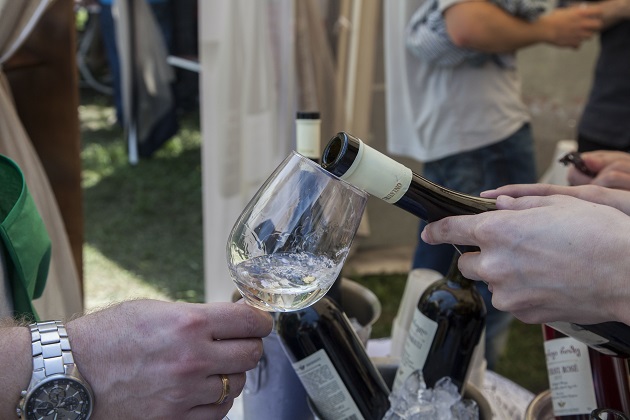 Rkatsiteli, Saperavi, Mtsvane Kakhuri, Tsitska, Tsolikouri, Chinuri, Shavkapito, Tavkveri, Krakhuna, Aleksandreuli, Chkhaveri, Usakhelouri, Khikhvi, Kisi, Aladasturi, Otskhanuri Sapere, Dzelshavi, Mujuretuli, Ojaleshi, Kundza, Grdzelmtevana, Chumuta, Chitiskvertskha - this is an incomplete list of wines to be discovered only at the Festival. Photo by Nino Alavidze/agenda.ge
Rkatsiteli, Saperavi, Mtsvane Kakhuri, Tsitska, Tsolikouri, Chinuri, Shavkapito, Tavkveri, Krakhuna, Aleksandreuli, Chkhaveri, Usakhelouri, Khikhvi, Kisi, Aladasturi, Otskhanuri Sapere, Dzelshavi, Mujuretuli, Ojaleshi, Kundza, Grdzelmtevana, Chumuta, Chitiskvertskha - this is an incomplete list of wines to be discovered only at the Festival. Photo by Nino Alavidze/agenda.ge
Canadian tourist Sara Thirnbeck was advised to taste homemade wine by Solomon Tetrashvili in Georgia’s capital city Tbilisi.
"I believed only in the capital city of Georgia you could taste wines. But it does not sound strange when you recognize that Georgia is the cradle of wine,” Thirnbeck said.
The wine festival in Georgia would not be complete without a smoky barbecue, called Mtsvadi (roast meat), and accompanying bread, called "Dedas Puri” (mother’s bread).
While this year’s festival has passed, make a note in your diary for next year’s May event, as the occasion is one you do not want to miss.
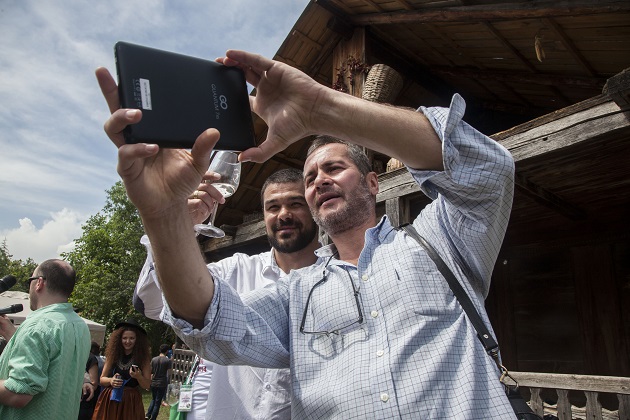 The National Rugby Team The Lelos players were special guests of this New Wine Festival. The Lelos captain Irakli Machkhaneli kindly agreed to take selfies with local fans. Photo by Nino Alavidze/agenda.ge
The National Rugby Team The Lelos players were special guests of this New Wine Festival. The Lelos captain Irakli Machkhaneli kindly agreed to take selfies with local fans. Photo by Nino Alavidze/agenda.ge
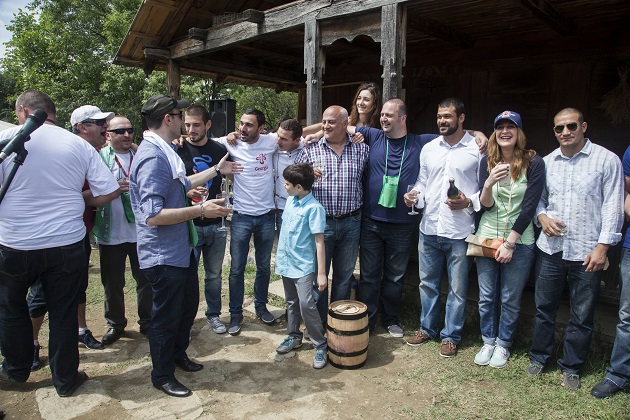 The Lelos was named as "Wine Club Friends 2014". Photo by Nino Alavidze/agenda.ge
The Lelos was named as "Wine Club Friends 2014". Photo by Nino Alavidze/agenda.ge 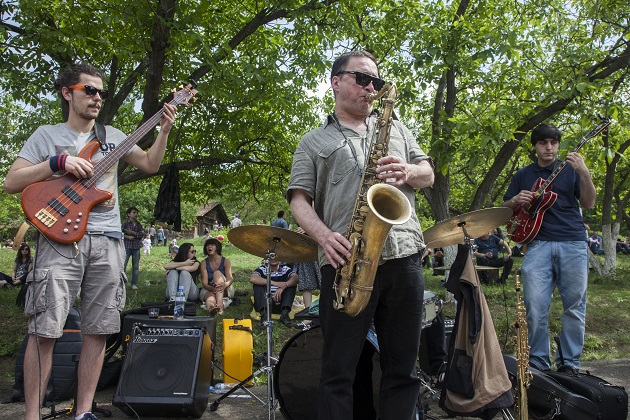 As guests sipped on their wine, local musicians from Jazz Quartet IrReSoNic and Folk Ensemble Akhlukhlebi entertained the crowds. Photo by Nino Alavidze/agenda.ge
As guests sipped on their wine, local musicians from Jazz Quartet IrReSoNic and Folk Ensemble Akhlukhlebi entertained the crowds. Photo by Nino Alavidze/agenda.ge
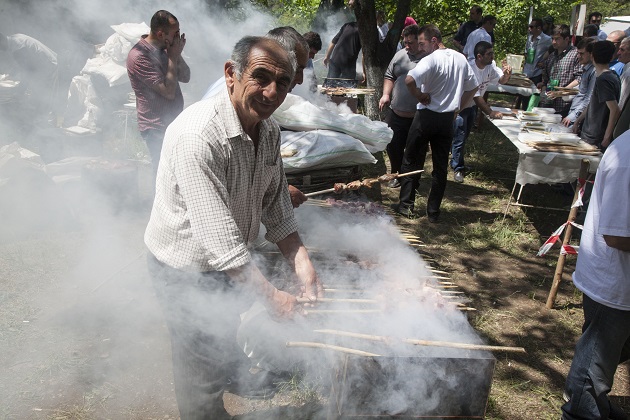 The villager of Vardisubani from Kakheti region Tamaz Margalitashvili has prepared barbecues. "Almost all villagers have arrived for wine festival to celebrate and recognize Kakhetian wine and barbecue and the people who make it,” Margalitashvili said. Photo by Nino Alavidze/agenda.ge
The villager of Vardisubani from Kakheti region Tamaz Margalitashvili has prepared barbecues. "Almost all villagers have arrived for wine festival to celebrate and recognize Kakhetian wine and barbecue and the people who make it,” Margalitashvili said. Photo by Nino Alavidze/agenda.ge
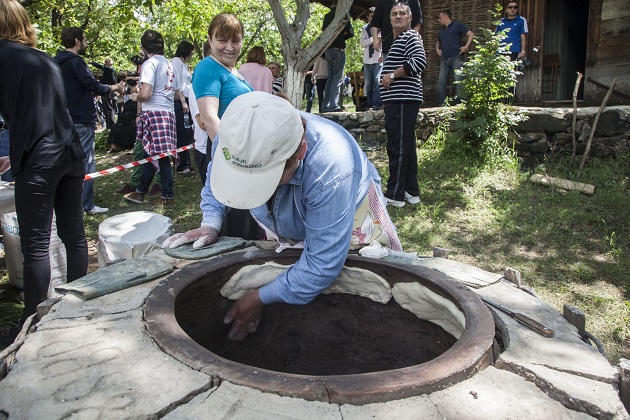 A woman is baking a Khachapuri, a traditional Georgian dish of cheese-filled bread. Makvala Jamburudze has arrived from Tsageri, a mountain region of Georgia to bake the breads and Khachapuris for the New Wine Festival Guests. "I have no time to give interviews, make a glance - so many people are standing in queues,” Jamburudze said. Photo by Nino Alavidze/agenda.ge
A woman is baking a Khachapuri, a traditional Georgian dish of cheese-filled bread. Makvala Jamburudze has arrived from Tsageri, a mountain region of Georgia to bake the breads and Khachapuris for the New Wine Festival Guests. "I have no time to give interviews, make a glance - so many people are standing in queues,” Jamburudze said. Photo by Nino Alavidze/agenda.ge 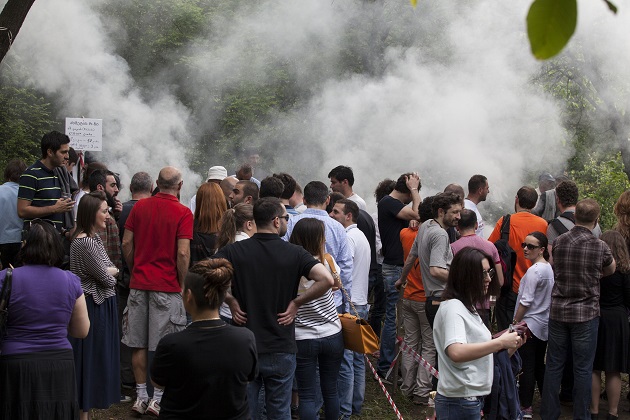 The queue in front of barbecue.Photo by Nino Alavidze/agenda.ge
The queue in front of barbecue.Photo by Nino Alavidze/agenda.ge
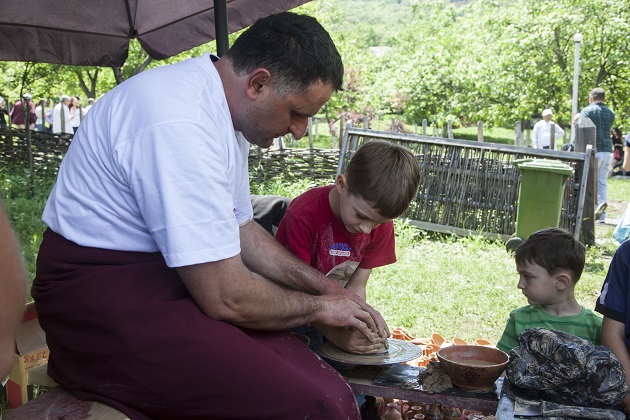 Ceramics maker, Ramaz Gakhutishvili is teaching a boy a pottery making. Pottery is the ceramic act of making pottery wares of which major types include earthenware. Photo by Nino Alavidze/agenda.ge
Ceramics maker, Ramaz Gakhutishvili is teaching a boy a pottery making. Pottery is the ceramic act of making pottery wares of which major types include earthenware. Photo by Nino Alavidze/agenda.ge
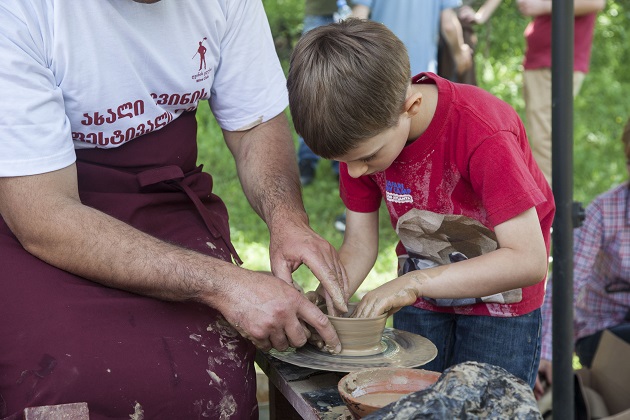 Children were happy to make their own pottery creation. Photo by Nino Alavidze/agenda.ge
Children were happy to make their own pottery creation. Photo by Nino Alavidze/agenda.ge
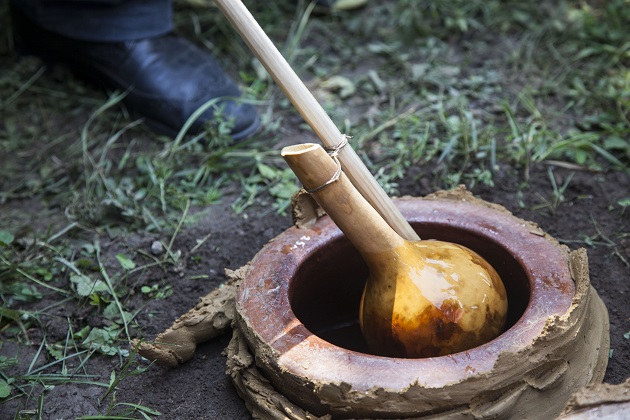 Orshimo, a long-handled gourd to ladle wine from a qvevri. Photo by Nino Alavidze/agenda.ge
Orshimo, a long-handled gourd to ladle wine from a qvevri. Photo by Nino Alavidze/agenda.ge
 Tweet
Tweet  Share
Share
